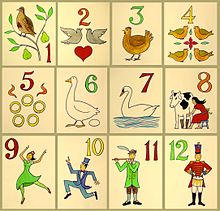Counting history
A counting story (also counting rhyme ) is a form of poetry . Counting stories count either in ascending or descending order, the principle being similar to the children's game of packing a suitcase ("I pack my suitcase ..."), except that the text is already given by the author of the verse. However, the story does not serve as a “random generator” (see counting rhyme ), but for entertainment or as a game itself.
to form
Simple counting stories only count up or down, the individual verses are always the same length. A typical example of this is the nursery rhyme Ten Little Negroes , the traditional Christmas carol The Twelve Days of Christmas or the music title Ten Little Jägermeisters from Die Toten Hosen from 1996.
More complex counting stories usually count upwards, the individual verses become longer and longer with each run, a new rhyme is added with each run. A very well-known example of this is The Farmer Sends the Jockel , the text here probably goes back to the Aramaic folk song Chad gadja , which is over 2500 years old .
According to the folk song collectors Ludwig Erk and Franz Magnus Böhme , the oldest written counting story is the song of the twelve sacred numbers . Thus the literary genre of counting history would be an originally Jewish tradition:
Erk and Böhme note:
“Narrative songs, in which every following stanza repeats what has been predicted backwards and at the end the whole is enumerated in reverse order, are called counting stories; they were used to pass the time and exercise memory. The oldest is that of the twelve sacred numbers. Perhaps the name can be derived from this. Meinert (Kuhländ. Volkslieder p. 442) is probably wrong when he asserts the following: 'These types of songs are called counting stories because they are used in the rock room to stimulate competition: in as much as is necessary to recite a line of rhyme to spin off a thread and count them after those. Skilled weirdos get it to sing and spin off the longest stanza before another one has finished with a thread and a line of rhyme or a short stanza '. "
Individual evidence
- ↑ Ludwig Erk, Franz Magnus Böhme: Deutscher Liederhort , Volume 3. Leipzig 1894, p. 530 ( digitized version ).
